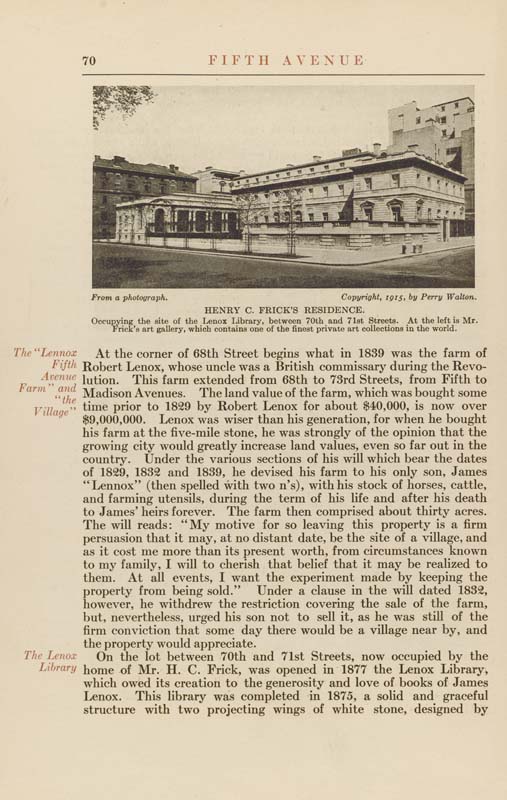70
FIFTH AVENUE
The"Lennox
Fifth
Avenue
Farm" and
"the
Village"
The Lenox
Library
From a photograph. Copyright, 1915, by Perry Walton.
HENRY C. FRICK'S RESIDENCE.
Occupying the site of the Lenox Library, between 70th and 71st Streets. At the left is Mr.
Frick's art gallery, which contains one of the finest private art collections in the world.
At the corner of 68th Street begins what in 1839 was the farm of
Robert Lenox, whose uncle was a British commissary during the Revo¬
lution. This farm extended from 68th to 73rd Streets, from Fifth to
Madison Avenues. The land value of the farm, which was bought some
time prior to 1829 by Robert Lenox for about $40,000, is now over
$9,000,000. Lenox was wiser than his generation, for when he bought
his farm at the five-mile stone, he was strongly of the opinion that the
growing city would greatly increase land values, even so far out in the
country. Under the various sections of his will which bear the dates
of 1829, 1832 and 1839, he devised his farm to his only son, James
"Lennox" (then spelled with two n's), with his stock of horses, cattle,
and farming utensils, during the term of his life and after his death
to James' heirs forever. The farm then comprised about thirty acres.
The will reads: "My motive for so leaving this property is a firm
persuasion that it may, at no distant date, be the site of a village, and
as it cost me more than its present worth, from circumstances known
to my family, I will to cherish that belief that it may be realized to
them. At all events, I want the experiment made by keeping the
property from being sold." Under a clause in the will dated 1832,
however, he withdrew the restriction covering the sale of the farm,
but, nevertheless, urged his son not to sell it, as he was still of the
firm conviction that some day there would be a village near by, and
the property would appreciate.
On the lot between 70th and 71st Streets, now occupied by the
home of Mr. H. C. Frick, was opened in 1877 the Lenox Library,
which owed its creation to the generosity and love of books of James
Lenox. This library was completed in 1875, a solid and graceful
structure with two projecting wings of white stone, designed by
|








